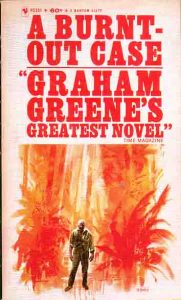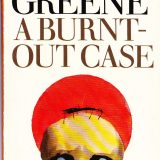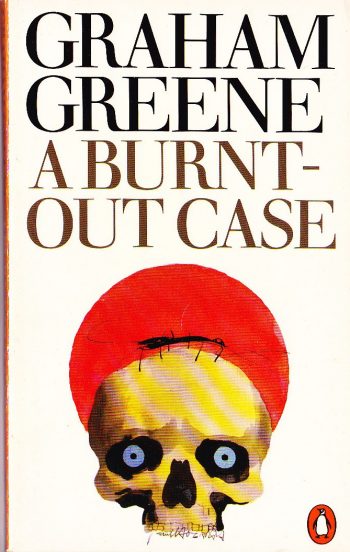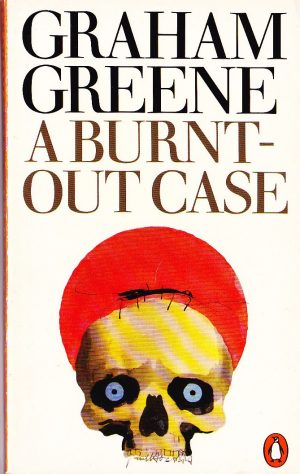A Burnt-out Case – Graham Greene – 1960
Reviewed by: D.W. Cymbalisty
I thoroughly enjoyed reading this book, as I have so many of Greene’s others, but I comment on this one because even as I read it, I knew it was displacing the others and becoming my favorite. I started it on an airline flight, and right there at cruising altitude I had to take out my notebook and begin a little journal of some of his descriptive sentences… I sincerely feel that Greene is one of the true masters of simile and metaphor. Indulge me please, some examples: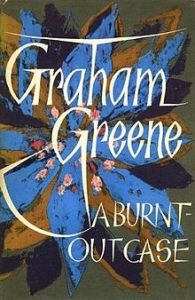
“A small black child hardly more than two feet high walked into the room without knocking, coming in like a scrap of shadow from the noonday glare outside.”
“The superior opened the door, and there the girl was on the threshold, like someone surprised by a camera in a night-club, looking up at the flash, with an ungainly grimace of pain.”
“Father Jean was tall, pale, and concave with a beard which struggled like an unpruned hedge.”
“His eyes were heavy and bloodshot; he pushed his shoulders forward on either side of his sunken chest as though they were the corners of a book he was trying to close.”
“The fathers in their white soutanes gathered on the veranda like moths round a treacle-jar…”
“The whisky was finished and the equatorial day broke outside the window like something smashed suddenly on the curb of the sky, flowing in a stream of pale green and pale yellow and flamingo pink along the horizon, leaving it afterwards just the plain grey colour of any other Thursday.”
“But Rycker was like a wall so plastered over with church announcements that you couldn’t even see the brickwork behind.”
Just so good! Anyways, I could go on like that for a long time, but I won’t. I can read his sentences out of their context, and still enjoy them for their sheer beauty. But there’s nothing disjointed or out of context about this story. For me, a significant theme in the book is that it is very difficult to successfully run away from one’s true vocation. In A Burnt-Out Case, the main character Querry tries to do just that. He feels that he has lost the passion he once had for his gifting in architecture, and he tries to run and hide in obscurity… to go into an early retirement. Due to his immense fame, he needs to go far (geographically) to do this, and as a result, he ends up (at the end of an arduous tsetse-fly infested boat ride) in the heart of an isolated leper colony in the Belgian Congo. Here, in his new life amongst the many priests who run the colony, and a very nosy journalist thrown into the mix, Querry will find out just how hard the ground is in which he attempts to bury his talents.
A great story, with some great twists, and some important lessons. Just beyond midpoint in the story, the narrator subtly drops this little thought… “The more bare a life is, the more we fear change.” I suggest applying that as an axiom to the various characters as you read through. Enjoy.
~
Posted by Lale on 21/7/2002, 23:25:14
As long as there are Ryckers, Father Thomases and Parkinsons there can be no peace and quiet for a recluse. People don’t leave you alone, it’s as simple as that. You have to go great lengths (sometimes geographically) to find a little solitude, and even then, it is not guaranteed that you’ll be granted any.
Why are we like that? Why do we always have to know everything about other people, why do we always have to ask questions, why can’t we let them be?
Querry thought he was a phony, he was fake, he was a fraud, he believed that he didn’t have any talent (in the past and present). Why can’t he be allowed to have this opinion of himself? I truly believed him. If I was in his company, I wouldn’t have challenged his belief of himself. Even if I really liked some of his designs.
If you are in the company of a fellow human being, you are not even allowed to keep quiet for longer than a certain number of minutes (decided by your past performances). Have you ever felt that people around you were not allowing you to be bored when that was the only kind of mental state you wished to be in at that time?
– What’s the matter, are you upset, are you not feeling good, did I say something wrong?
The man built churches and he was not a religious man. He didn’t pray, he didn’t believe in God. Eventually, he decided that building churches was dishonest for someone who didn’t see value in them. And/or he didn’t think he had any talent. It is absurd to keep telling him otherwise.
I really liked this book. It explored a few theories that I had pondered myself before. Four stars.
Lale
~
Posted by Stephen Hill on 22/7/2002, 18:46:22 , in reply to “A Burnt-Out Case – Graham Greene”
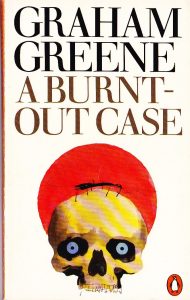 Graham Greene stories always seem to expose the insincerity and conceit of characters, which strangles the protagonist at an unguarded moment. Rycker and Father Thomas characters are the sort of appalling hypocritically pious characters you often expect in a Greene novel. However, Parkinson in my mind is a different beast, albeit another unpleasant species.
Graham Greene stories always seem to expose the insincerity and conceit of characters, which strangles the protagonist at an unguarded moment. Rycker and Father Thomas characters are the sort of appalling hypocritically pious characters you often expect in a Greene novel. However, Parkinson in my mind is a different beast, albeit another unpleasant species.
One gets the impression that in several of Greene’s major works ‘The Heart of the Matter’, ‘The Power and the Glory’ are riddled with such conceited fools. That Querry’s death is the result of actions of a few self-righteous fools, illustrating how a noble impulse can be mutated into something totally undesirable in the hands of an insincere or immature character. It is worth noting that Greene’s Catholicism must have had a profound influence on his work, a theme explored in many of his novels. Querry like Scobie in ‘The Heart of the Matter’ and the Whiskey Priest in ‘The Power and the Glory’, are both victims of their own honesty. Their sincerity actually inhibits their ability to live up to particular societal preconceptions. Neither Scobie nor the Whiskey Priest are pious enough to disregard the behaviour of others and they’re refusal to condemn others inevitably plays a part in their downfall. Dostoyevsky’s Idiot is another perfect example of this – a character too honest to function within a community riddled with such conceits. It is a timeless theme that Greene has revisited with much aplomb on many occasions.
Rycker and Father Thomas both claim to be suffering from spiritual afflictions and both are quick to consider the possibility of Querry providing the panacea to cure their jaded existence. However, the Superior early in the novel is quite perspicacious when he says of Rycker: “When a man has nothing else to be proud of he is proud of his spiritual problems.” The Superior also identifies a similar problem in Father Thomas, who assumes that Querry is a saint-like character. Both characters are so sure of themselves, one character notes within the novel that he is disturbed by a man without fear as he would be by a man without a heart. This is a prescient statement when you consider the actions of Rycker and Father Thomas. A sense of doubt or some form of evaluative process is necessary when one considers embarking on judging human actions and motivations. Yet, both Rycker and Father Thomas seem so certain of their beliefs that a slight of honour or a simple misunderstanding can result in a minor dilemma unraveling into a catastrophic conclusion. Of course this ending is rather ironic as Querry the burnt-out case (in the spiritual sense) is both cured and killed by his ability to laugh at himself.
In a display of destructive vanity, Rycker cannot bear being seen as less important than another character. It is very much this that allows to believe his wife’s lies, despite the presence of any corroborating evidence. Indeed, Rycker feels more cuckolded by Querry being a famous architect than by any possibility of adultery. The fact that he is unable to attain what is ephemeral at its best – fame, is what transforms admiration for Querry to blind hatred.
Indeed, one could suggest that Rycker’s inability to examine the problems of those around him, and his use of theology to confirm his beliefs is partly behind his downfall. Rycker stuck within the constraints of a stale marriage is more concerned with religious precepts than with the spontaneous enjoyment of life. The overwhelming ennui that burdens Rycker is more the result of his inflexible mind-set than any of the minor faults he accuses his unfortunate young wife of possessing. Rycker who claims to have a profound self-awareness remains such an egotist that even at the end of the novel he is unable to identify the root causes of his troubles – the unhappy marriage, his unrealistic expectations etc.
Father Thomas is a similar kettle of fish, he responds to the Church teachings with a belief that at its centre is nothing more than ritualistic cliches. Neither character has an adequate inner life, and neither character seems to recognise that these failings are the source of their unhappiness. If you consider the devout Stephen Dedalus in James Joyce’s ‘Portrait of an Artist as a Young Man’ Dedalus eventually after much struggle recongises that spirituality exceeds mundane rituals. It is his search for a more religious religion that makes him a spiritual human-being not adherance to protocols.
Juxtaposing Father Thomas is the atheist realist Doctor Collin who seems to have done the most work to ameliorate the suffering of the lepers within the book. He has to be the most grounded character, who whilst losing his faith has maintained his faith in serving humanity.
Collin is originally skeptical of Querry, seeing him as a Father Damien emulator, or a ‘leprophil’ as he calls it. But Collin eventually warms to Querry.
Collin is in some ways an ascetic. Collins says: ‘With suffering we become part of the Christian myth.” Yet, Collin seems much more able to deal with characters on a human level than the fathers in the camp.
The characters are again the strength of Greene’s work. Four stars.
~
Posted by Guillermo Maynez on 25/7/2002, 0:00:50 , in reply to “Re: A Burnt-Out Case – Graham Greene”
Have you ever noticed that most people who claim to deeply love the humankind or God are unable to love the specific persons around them?
Like Rycker and Father Thomas.
Now, I was surprised to see how Lale’s initial comments agree with the first thought I had right after I finished the book: “Why can’t these stupid people leave Querry alone?”
I think that he was brave in seeing things as they really seemd to him to be. He got depressed, and came to think that he had never really loved any of the many women that fame and money brought to him; he came to think that building churches and not believing in God was dishonest. So he escaped from all that people who falsely adulated him, and ran away to think a bit.
But fools are inescapable: they always get you when all you want to do is think by yourself and not mess with anybody.
Querry was finally feeling himself whole again, doing something useful and good just for the sake of it, not expecting applause, interviews or fame. He was doing something positively good for poor and sick people. But Rycker -a most unlikable person- had to ruin it all, assisted by the despicable and corrupt journalist Parkinson and Rycker’s poor but crazy wife.
It is a sad story, but it is a deep one, probably even with a moral for all of us: when someone thinks you are too good, beware of him. Idols go up and down just as easily.
I very much liked this novel, because it has eternal subjects: faith, God, sense in life, fame, solitude in the middle of apparent success, and the search for meaning that no one can do for us.
About other characters, I really liked Dr. Colin, my kind of real hero, and the Superior, a wise and sensible man.
Very good choice, a book with much to think about and well written: sober, to the point, clear and concise. It’s about time I pick up other Greene’s novels waiting in the shelf and take a look at them.
~
Posted by Guillermo Maynez on 25/7/2002, 0:03:39 , in reply to “Re: A Burnt-Out Case – Graham Greene”
By the way, although the two books are very different in content, setting and style, at some point I was reminded of the young man in “The Razor’s Edge”, who was offered a lucrative position in finance, a civilized and comfortable environment, and a -most of the time- nice wife, but who decided to leave all that and travel the world looking for something else.
~
Posted by Dave on 30/7/2002, 5:52:58 , in reply to “Re: A Burnt-Out Case – Graham Greene”
Interesting Guillermo, to tie Querry in with Larry from The Razor’s Edge. They are similar personas in many ways.
And I agree with yours and Lales’s comments re: Why can’t they just leave Querry alone? Why do we fixate so terribly on what people DO?
For instance, when we meet new people, what is the most common question we are asked?
“So, what do you do?”
Especially in today’s world, where more and more people are trapped in jobs that they actually loathe… “What do you do?” becomes a very inaccurate question to get a pulse of what the person is all about.
In my opinion, a more accurate way of getting to know what a person is like would be to ask them…
“So, what do you like to do when you are NOT working?”
At any rate, even if a person is fortunate enough to be employed in some field that is their TRUE vocation… the way we ask these introductory questions shows just how much emphasis we place on a person’s “occupation”. As though their current form of economic sustenance is who they ARE as a person!
I, for one, would be much more interested in what that person’s “preoccupation” is, than with what their “occupation” is. (bad sentence structure there, I know, but I’m tired).
Querry was someone who was trying to live the rest of his life with a little more integrity (freedom?) and others were too nosy to let him do so. And they couldn’t separate the man from what he DID!
As Lale asked, “Why are we like that? Why do we always have to know everything about other people, why do we always have to ask questions, why can’t we let them be?”
The guy’s burnt out. Why do we make it our business to set him on fire again?
Greene is an excellent writer, and as I have said in my review of this book at readliterature, I consider him to be the master of metaphor. I give this book four hearts, and my review points out the one little minor glitch I find in the story.
Well… I’ve got to go to sleep now so I can go to a job that I loathe in the early morning…
~
Posted by Lale on 31/7/2002, 15:02:49 , in reply to “Re: A Burnt-Out Case – Graham Greene”
: “So, what do you do?”
I hate that question too. I guess it is ok if you are an astronaut or a published author or something.
Some people have one-word-professions, “nurse” for instance. But for most of us, what we are trained for, and what we do, and what we do part time, and what we specifically choose not to do, etc. are too complicated to be explained to a total stranger five minutes into a party.
Once my business card read: “Principal Software Consultant”. What the heck does that mean?
In Margaret Atwood’s Cat’s Eye, the heroine is an artist. In passport forms and stuff, in answer to the “profession” field, she writes “painter”, since “the other alternative would be housewife”.
Dave, I know what you studied and what you do. I can just imagine how helpless you must feel when confronted with a “what do you do?”. I sometimes give the long answer, I say “I studied this, but I do this”. Do you do that too? I think we should be allowed to bore them out of their brains since they ask such unoriginal questions.
Another question I hate is “where do you come from?”. Where I come from is very complicated, I dread that question. Especially when we are travelling abroad.
“I carry a Turkish birth certificate, a Canadian passport and a Parisian home address, my grandmother was … “
Worse for my daughter, she was born in Germany.
~
Posted by Chris on 2/8/2002, 16:04:51 , in reply to “Re: A Burnt-Out Case – Graham Greene”
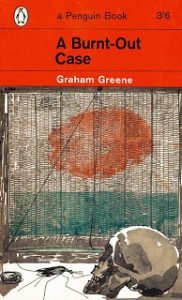 Stephen makes an excellent point about the insincerity of Greene’s characters. It is interesting how Querry and Rycker/Father Thomas are insincere, yet in completely different ways. Querry is able to convince himself that he is burnt-out (until he finds that he isn’t) and the two-headed monster of Rycker and Father Thomas convinces itself that Querry is a saint. The sad thing is that this self-delusion leads only to disappointment and death (in Querry’s case).
Stephen makes an excellent point about the insincerity of Greene’s characters. It is interesting how Querry and Rycker/Father Thomas are insincere, yet in completely different ways. Querry is able to convince himself that he is burnt-out (until he finds that he isn’t) and the two-headed monster of Rycker and Father Thomas convinces itself that Querry is a saint. The sad thing is that this self-delusion leads only to disappointment and death (in Querry’s case).
For me, one of the striking themes of this novel is a subtle fatalism in that pervades almost all of the characters. Querry comes to the leproserie to die, believing that he has no other use; Rycker accepts and even relishes his obsession with his “religious quandries” even though they make him useasy and his marriage a sham.
The only two characters that do not subscribe to the fatalism are Father Thomas and Marie. Sadly, their methods of breaking free are wildly different but equally tragic. Father Thomas seems to brainwash himself into a kind of false piety (I am always suspicious of the ‘true believer’ who is constantly rationalizing his/her faith – they always strike me as too weak to face the world without a religiously constructed worldview, so they cling to it without introspection and despite their misgivings) as a way to cope with choosing a vocation which does not seem to have chosen him.
Marie, trapped in a horrible marriage, is the only character who seemed to take controll of her destiny. She was the only one brave enough to dare escape her circumstances, although her choice of feigning a Querry-induced pregnancy had its own tragic consequences.
Her decision to use Querry as her means of escape truly disappointed me because she was the only character in the book that I felt any simpathy for. She was weak and immature, but for that reason was the only character not directly responsible for her misery.
As always, Graham Greene writes in that wonderfully conversational tone that makes him so readable. It’s funny that Greene’s style is not easily described or categorized, but readily recognizable.
Not my favorite Greene book, but pretty good. The lack of sympathetic characters and the too-tidy ending left me a bit cold.
3 of 5 stars.
